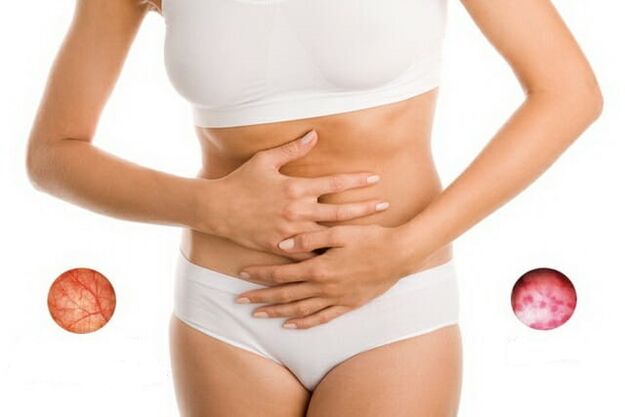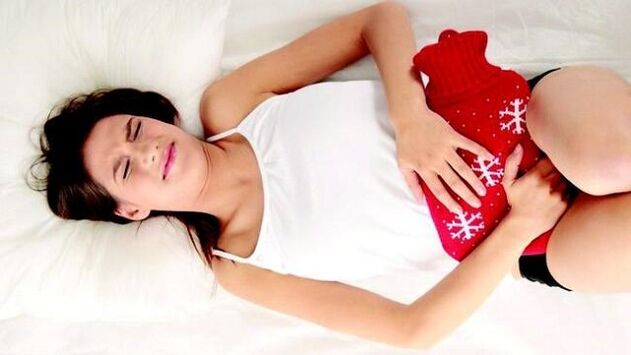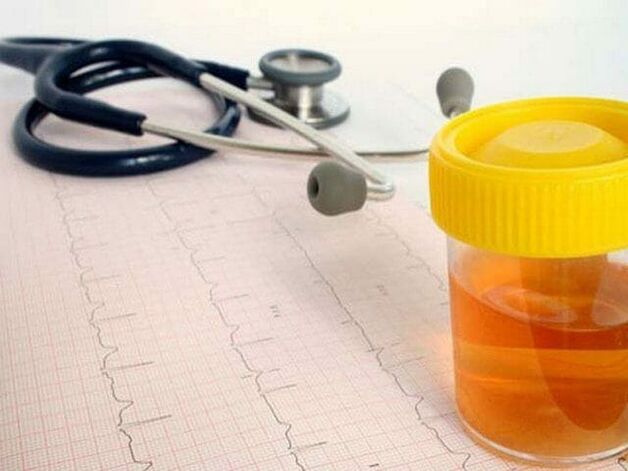Cystitis is a bladder disease that presents with acute symptoms.This disease most commonly affects women due to the structural characteristics of their urethra.What are the symptoms of cystitis and how to treat it?What to do at the first sign of cystitis?How is bladder inflammation treated?All these questions bother people who are facing cystitis and they don’t know what the treatment options for cystitis should be and whether cystitis can be cured forever.

What causes this disease?
If cystitis occurs, not everyone knows what to do and how to treat it correctly.In addition, it is also necessary to find out what is the cause of bladder inflammation, and different symptoms can be treated differently.
The most common causes of cystitis:
- Poor hygiene in private areas;
- Poor blood circulation in the pelvic organs;
- Abuse of spicy food;
- low temperature;
- Urethral mucosal damage;
- Sexual intercourse without barrier contraception;
- Infection in the body;
- Gynecological diseases.

The causes of cystitis and its manifestations vary widely.The primary infection is thought to be one that penetrates the vagina and from there into the urethra.This is often the cause of cystitis.
Another factor that causes cystitis is hypothermia, so it is important for women not to freeze their feet and to keep their pelvic area and waist warm.
A common cause of cystitis is an inactive lifestyle leading to stagnant blood in the genitourinary organs.
Chronic female diseases can lead to cystitis.Their presence creates a favorable environment for the infection to spread to the urinary system organs.By getting rid of them, you can quickly cure cystitis once and for all.
Cystitis can also occur against the background of hormonal imbalances and vitamin deficiencies.
Neglecting the rules of intimate hygiene can lead to cystitis.This disease will be felt if:
- Failure to change tampons and pads in time during menstruation;
- Prioritize wearing chemical fiber underwear;
- No pattern of emptying the bladder was observed;
- Not wiping the anus properly after defecation.
90% of cases are caused by E. coli and Staphylococcus aureus.These pathogenic microorganisms can invade the urethra from the rectum.
Types of cystitis
Pathologies such as cystitis are divided into acute and chronic.The acute form of the disease causes noticeable symptoms.Occurs under the influence of stimulating factors.
Chronic cystitis is characterized by less obvious symptoms.Most often, it is caused by other diseases.
Depending on what causes the inflammation, cystitis is classified into primary, secondary, bacterial, and nonbacterial.Another common urinary tract inflammation is cervical cystitis.
Bacterial cystitis can be caused by infection from various sources.These include streptococci, enterococci, and gonococci.
Nonbacterial cystitis occurs when the bladder wall becomes irritated by drugs or chemicals.
For primary cystitis, damage to the bladder itself is important under the influence of certain factors.Secondary lesions occur in the context of other lesions in the organ or nearby organs.
Cervical cystitis is considered one of the most common diseases.What causes this type of cystitis?Cervical cystitis is usually contagious.Inflammation affects the lower area of the trigone of the bladder.The causes of this type of cystitis are viruses and simple fungi.
Cervical cystitis presents like other types of urinary tract inflammation.The first symptoms of this type of cystitis are persistent emptying of the bladder and discomfort in the bladder area.Pain and burning may occur during urination and become unbearable by the end of urination.
logo
How to recognize cystitis and what symptoms should you look out for?The symptoms of urinary tract inflammation depend on the form in which it occurs.
Patients with acute cystitis will experience symptoms such as severe pain in the lower abdomen, inability to urinate, and painful defecation.
Chronic cystitis is an insidious disease because it may occur without obvious symptoms.
Symptoms of acute bladder inflammation:
- pain, cutting;
- Persistent "small" urges to go to the bathroom;
- cloudy urine;
- temperature rise;
- Blood in urine.
If a man experiences these symptoms, he needs urgent help from a urologist.Prostate, urolithiasis and diabetes problems may also be the cause of the condition in men.
Experts will tell you how to get rid of cystitis and develop a treatment plan for comprehensive treatment of your bladder.
diagnosis
What should I do if I have signs of bladder inflammation?How to cure cystitis quickly?Is it possible to overcome it completely?These problems often occur in people who suspect they have cystitis.Only an expert can tell you how to treat cystitis.

Women who experience discomfort in their urinary area should contact their gynecologist, who will tell you what tests are needed and what can help you find a reliable diagnosis.Doctors can find out what triggers cystitis and find out if it's a female condition.The patient will be asked to undergo a comprehensive examination.
Diagnosis of cystitis includes:
- General analysis of urine and blood;
- bacteriological urine culture;
- PCR diagnosis;
- Cystoscopy;
- ultrasound;
- Sometimes diagnosing cystitis requires a biopsy.
Cystitis and urethritis are two different concepts and should not be confused with each other.
Urethritis is inflammation of the urethra.Symptoms are excruciating burning, cramping, and pain when emptying the bladder.In most cases, these two diseases go hand in hand.
If treatment of cystitis does not produce positive results and the inflammatory process becomes protracted, you should definitely find out why this is happening.In this case, for effective treatment, it is necessary to distinguish cystitis from possible pathology.They may be prostatitis, urinary tract cancer, tuberculosis.
When making a correct diagnosis, it is necessary to take into account that the body temperature does not rise above 37.5.If the increase is significant, emergency medical attention is needed to rule out pyelonephritis.
treat
What is cystitis and how is it treated?What are the symptoms of cystitis and how to treat cystitis?First, you need to pay attention to the first signs that may confirm the diagnosis of cystitis; this condition should be treated promptly and comprehensively.

Your doctor can tell you how to get rid of the pain caused by cystitis and what medications you can use.If the cystitis is acute, the patient is prescribed antispasmodics, antiseptics and tea with diuretic effect.When severe pain occurs due to pathological causes, medications may be prescribed to eliminate spasms of the bladder muscles.
First aid for cystitis also includes heat exposure.If there is no fever or bleeding, a heating pad can be placed on the lower abdomen.
To treat cystitis quickly, it is important to take the medications prescribed by your doctor, follow your drinking habits, follow your dietary habits and undergo some physical therapy procedures to help you get rid of cystitis quickly.In more complicated cases, doctors may prescribe bladder irrigation to treat cystitis.
Treatment of cystitis is also based on the use of herbs with diuretic properties.We're talking about bearberries, huckleberry leaves.If you have cystitis, drink cranberry juice.
Natural preparations are also a good first aid treatment for cystitis.
If bladder inflammation occurs, treatment should include warm baths with herbal remedies.
Cystitis is not always treated quickly and requires a diet.Spicy, pungent and salty foods should be excluded from the menu as the bladder may become more inflamed.
If chronic cystitis occurs as a result of untreated cystitis, there are measures that can be taken, the task of which is to normalize the outflow of urine.
antibiotic
What medicine should I take if I find cystitis?Only an expert can tell you how to properly treat cystitis.To get rid of cystitis forever, in most cases you will need to take antibacterial medications.Antibiotics are not completely harmless medicines and should be chosen by a doctor.
traditional medicine
What to do if you have cystitis and what treatments are available to help you feel better?Of course, we should not forget about unconventional methods of treating this disease.The first aid method for cystitis is heat.The most effective include the following:
- Boil 3 liters of milk and pour into a bowl of water.The patient needs to immerse their feet in slightly cooling liquid and wrap themselves in a blanket
- The red bricks must be heated over a fire and placed in a metal bucket.Cover the container with a cloth.The patient is asked to take off their clothes and sit on a bucket wrapped in a blanket.You need to maintain this position until the brick stops radiating heat.
The treatment of bladder inflammation does not always allow the use of heat therapy.This type of surgery cannot be done if you have diseases like fibroids, uterine fibroids, etc.

Herbal infusions have a therapeutic effect on inflammation of the urinary system.You'll want to mix together equal parts parsley, thyme, dill and knotweed.Pour all this into boiling water and leave for an hour.Take the soup every day, half a cup each time, 3 times a day for 20 days.
Traditional methods can quickly help cystitis only through comprehensive treatment.
complication
Only comprehensive and effective treatment can quickly treat and relieve patients' acute symptoms.It happens that self-treatment can cause a lot of harm; cystitis in this case will subside for a while, but under the influence of certain factors it may appear immediately.This may be chronic cystitis, the symptoms of which are important to be recognized and treated promptly.What if cystitis doesn’t go away?In this case, cystitis is most likely secondary, and diagnosis can determine the cause of the disease.
Cystitis that is not completely cured is dangerous because it can lead to many complications.An infection in the bladder may spread to the kidneys, causing pyelonephritis.
As soon as the first symptoms of urinary tract pathology are detected, an urgent visit to a gynecologist and urologist is required.An expert will diagnose and tell you how to cure cystitis permanently.
If cystitis occurs, immediate first aid must be provided, otherwise the disease will become chronic and cause serious consequences.
























